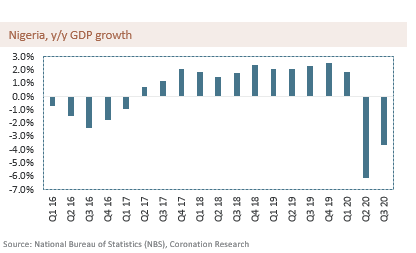Recently the National Bureau of Statistics (NBS) released GDP data for Q3 2020, showing a decline of -3.62% y/y with Non-oil GDP falling by just -2.51% y/y. The Non-oil GDP growth drivers were the Telecoms sector (+17.36% y/y) and Agriculture (+1.39% y/y).
These data are considerably better than expected, especially the Non-oil GDP data and show several sectors – notably Manufacturing – adapting to difficult conditions in consumer and FX markets. After 1.87% y/y growth in Q1 and a -6.10% y/y contraction in Q2, it now looks like the IMF’s June forecast a full-year recession of -4.3% y/y is on the pessimistic side.
Positive implications for equities. The stock market is undergoing a bull run, which is consistent with seeing this as a V-shaped recession with a clear exit early next year. Although this is plausible if Brent crude prices recover to US$50.00/bbl (currently US$48.21/bbl), it is less plausible if oil prices falter. The telecoms sector continues to grow with data partly replacing lost voice revenues.
Negative for inflation. The slowdown in Trade is associated with a steep fall in FX transaction volumes and a fall in the Naira in the parallel market, bringing increases in input costs. Agricultural production may not be growing as fast as population growth. October’s 14.23% y/y inflation (September: 13.71% y/y) could rise further.
Neutral-to-negative implications for interest rates. The Monetary Policy Council of the Central Bank of Nigeria retained its headline rate at 11.50% last Tuesday, a clear signal that it is happy with low market interest rates. Going into Q1 2021 fixed income liquidity may not be as high as during 2020, with the possibility that rates may begin to move up gently during the year.















